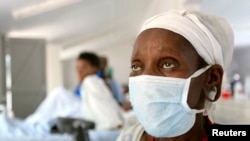A report in a medical journal reported that South Africa has released patients with a highly drug-resistant form of tuberculosis into the general population.
The study, published in The Lancet on Friday, tracked 107 people with the drug-resistant TB in three South African provinces between 2008 and 2012.
The report said 78 patients in the study died despite being treated with between six to 10 drugs.
However, more than 40 people with the deadly strain were discharged from the hospital without further monitoring.
TB is a bacterial infection that usually affects the lungs and is often spread by coughing and sneezing. The virtually untreatable tuberculosis is known as XDR-TB.
Keertan Dheda of the University of Cape Town, who led the study, said the discharged patients pose a major risk to other people because they can survive for months or even years while "contributing to the community-based spread of XDR-TB."
In one case, DNA testing confirmed one discharged XDR-TB patient passed on the deadly germ to his brother. They both died.
Dheda described the situation as alarming and called for modern sanatoriums to be built so patients can be treated away from society.
The study, published in The Lancet on Friday, tracked 107 people with the drug-resistant TB in three South African provinces between 2008 and 2012.
The report said 78 patients in the study died despite being treated with between six to 10 drugs.
However, more than 40 people with the deadly strain were discharged from the hospital without further monitoring.
TB is a bacterial infection that usually affects the lungs and is often spread by coughing and sneezing. The virtually untreatable tuberculosis is known as XDR-TB.
Keertan Dheda of the University of Cape Town, who led the study, said the discharged patients pose a major risk to other people because they can survive for months or even years while "contributing to the community-based spread of XDR-TB."
In one case, DNA testing confirmed one discharged XDR-TB patient passed on the deadly germ to his brother. They both died.
Dheda described the situation as alarming and called for modern sanatoriums to be built so patients can be treated away from society.





